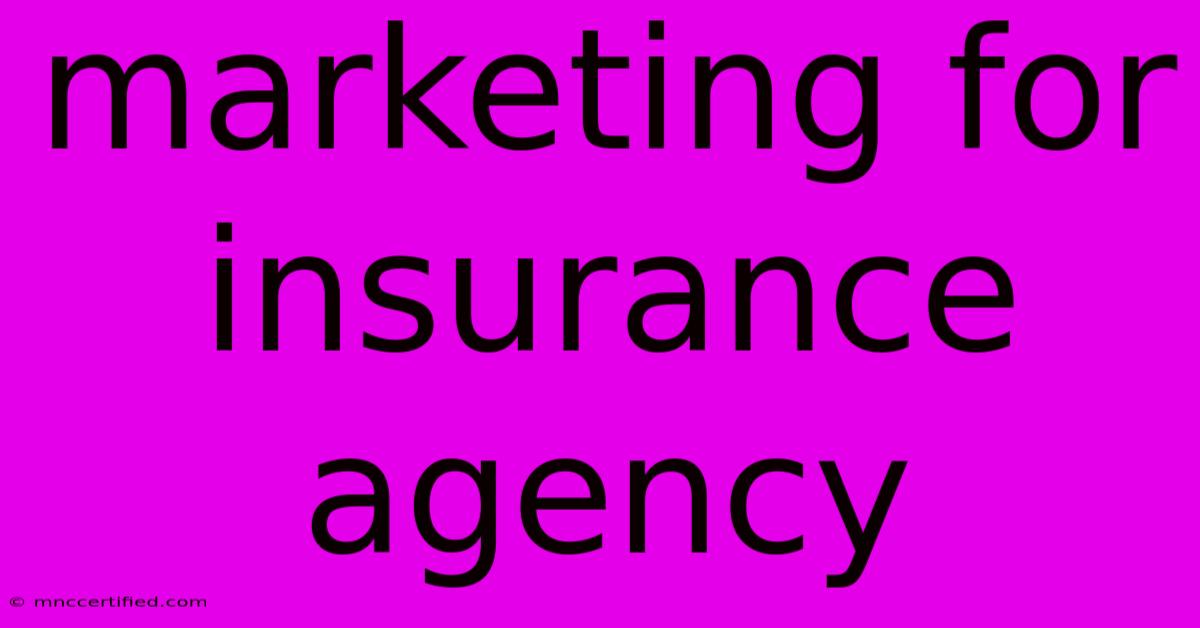Marketing For Insurance Agency

Table of Contents
Marketing for Insurance Agencies: A Comprehensive Guide to Growth
The insurance industry is competitive. Standing out requires a robust and well-executed marketing strategy. This guide provides a comprehensive overview of effective marketing tactics for insurance agencies, helping you attract new clients and build lasting relationships.
Understanding Your Target Audience: The Foundation of Success
Before diving into specific strategies, understanding your ideal client is crucial. Who are you trying to reach? Are you focusing on:
- Individual consumers? Consider their age, income, lifestyle, and specific insurance needs (auto, home, life, health).
- Small businesses? Tailor your message to their unique concerns, such as liability, workers' compensation, and property insurance.
- Large corporations? Focus on specialized insurance solutions and a sophisticated approach to risk management.
Defining your target audience informs every aspect of your marketing, from your messaging to your chosen channels. Detailed buyer personas can be incredibly valuable here.
Digital Marketing Strategies for Insurance Agencies
Digital marketing is no longer optional; it's essential. Here's how to leverage it effectively:
1. Search Engine Optimization (SEO): Be Found Online
- Keyword research: Identify the terms people use when searching for insurance online (e.g., "best car insurance in [city]", "[type of insurance] quotes"). Utilize tools like Google Keyword Planner, SEMrush, or Ahrefs.
- On-page optimization: Optimize your website content with relevant keywords, ensuring clear, concise, and engaging copy. Focus on high-quality content that answers your target audience's questions.
- Off-page optimization: Build high-quality backlinks from reputable websites to increase your domain authority and search engine rankings. Guest blogging, directory submissions, and social media engagement all contribute.
- Local SEO: If you serve a specific geographic area, optimize your Google My Business profile and ensure your website lists your accurate address, phone number, and business hours.
2. Pay-Per-Click (PPC) Advertising: Drive Targeted Traffic
PPC advertising, such as Google Ads, allows you to target specific keywords and demographics, ensuring your ads are seen by the right audience. Carefully track your campaign performance and adjust your bidding strategies accordingly. Consider using negative keywords to avoid irrelevant clicks and wasted budget.
3. Social Media Marketing: Build Brand Awareness and Trust
Social media platforms like Facebook, LinkedIn, and Instagram offer excellent opportunities to connect with potential clients. Share valuable content, engage with your followers, and run targeted advertising campaigns. Remember to maintain a consistent brand voice and professional image.
4. Email Marketing: Nurture Leads and Build Relationships
Email marketing is a powerful tool for nurturing leads and converting them into paying customers. Segment your email list based on client needs and interests, and provide valuable content that addresses their specific concerns. Avoid overly promotional emails; focus on building trust and providing value.
5. Content Marketing: Establish Expertise and Authority
Creating valuable content, such as blog posts, infographics, and videos, positions your agency as an industry expert. This builds trust and attracts potential clients. Focus on topics relevant to your target audience, addressing their pain points and providing solutions.
Traditional Marketing Tactics Still Relevant
While digital marketing is crucial, traditional methods still hold value:
- Networking: Attend industry events and build relationships with other professionals. Referrals remain a powerful source of new business.
- Community involvement: Sponsoring local events or charities can enhance your brand image and build goodwill within your community.
- Print advertising: While less prevalent, targeted print advertising in local publications can still be effective, particularly for reaching older demographics.
Measuring Your Success: Key Performance Indicators (KPIs)
Regularly monitor your marketing efforts to assess their effectiveness. Key performance indicators (KPIs) to track include:
- Website traffic: Monitor your website's traffic using Google Analytics.
- Lead generation: Track the number of leads generated from different marketing channels.
- Conversion rates: Measure the percentage of leads who convert into paying customers.
- Customer acquisition cost (CAC): Determine the cost of acquiring a new customer.
- Return on investment (ROI): Calculate the return on your marketing investments.
By implementing a comprehensive marketing strategy that combines digital and traditional tactics, and continuously monitoring your results, your insurance agency can achieve sustainable growth and success. Remember to adapt your strategy based on performance and evolving market trends.

Thank you for visiting our website wich cover about Marketing For Insurance Agency. We hope the information provided has been useful to you. Feel free to contact us if you have any questions or need further assistance. See you next time and dont miss to bookmark.
Featured Posts
-
Rev Coles On Husbands Death I M A Celeb
Nov 27, 2024
-
This Morning Bonnie Blue Sparks Viewer Debate
Nov 27, 2024
-
Village Auto Insurance Georgia
Nov 27, 2024
-
Manchester City Feyenoord Live Champions League
Nov 27, 2024
-
Sporting Arsenal 46 Yard Goal
Nov 27, 2024